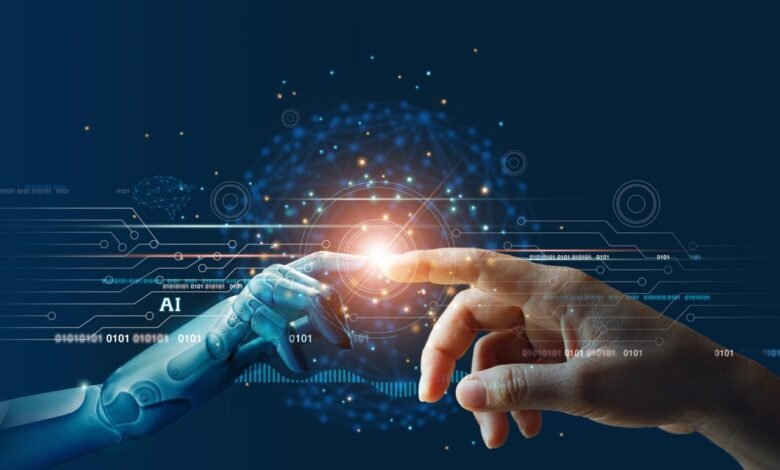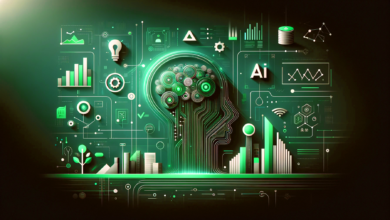
In the pulsating heart of Europe, Germany stands poised at the forefront of a profound transformation – the Digital Revolution. In an age where technology is the architect of societal change, Germany is navigating this transformative journey with precision and innovation. The fusion of traditional German engineering prowess with cutting-edge digital advancements paints a vivid picture of a nation shaping its destiny through technology. This article delves into the intricate tapestry of the “Digital Revolution: How Technology is Shaping Germany’s Future,” unraveling the layers of technological evolution and its far-reaching impact on various aspects of German society, economy, and culture.
As we embark on this exploration, the term “Digital Revolution” encapsulates the seismic shift brought about by technology, where every facet of life undergoes a profound metamorphosis. From historical milestones to the contemporary tech landscape, Germany’s trajectory showcases not only adaptation but an eagerness to lead in the global tech arena. Join us on this journey through the digital corridors of Germany, where the fusion of tradition and innovation paves the way for a future sculpted by the relentless march of technology.
Digital Revolution
Historical Context of Digital Transformation in Germany
Germany’s evolution into a digital powerhouse is rooted in its rich history of innovation. From the industrial revolution to the rise of the internet, each era has contributed to the nation’s technological prowess. The foundations laid in the past now support a thriving digital landscape.
The Role of Industry 4.0 in Germany
Central to Germany’s Digital Revolution is Industry 4.0, a concept revolutionizing manufacturing through automation and data exchange. Factories equipped with smart technology enhance efficiency and productivity, positioning Germany as a global leader in smart manufacturing.
Innovations and Technological Advancements
The landscape of German innovation is dotted with breakthrough technologies. From artificial intelligence to renewable energy solutions, startups and established enterprises alike contribute to a vibrant ecosystem that propels Germany forward.
Digitalization in Education
In the realm of education, Germany embraces digitalization to enhance learning experiences. Integrating technology into classrooms provides students with tools to thrive in the digital age, although challenges such as access and digital literacy remain.
Smart Cities and Sustainable Technology
German cities are not just becoming smart; they are also focusing on sustainable technology. Initiatives aimed at reducing carbon footprints and creating eco-friendly urban spaces showcase a commitment to environmental responsibility.
Economic Impact of the Digital Revolution
The digital economy in Germany is a powerhouse driving economic growth. As traditional industries digitize, new job opportunities emerge, reshaping the employment landscape and contributing to Germany’s economic prosperity and Digital Revolution.
Challenges Faced in the Digital Revolution
However, the digital revolution brings its own set of challenges. Cybersecurity concerns loom large, requiring concerted efforts from both the public and private sectors to safeguard against potential threats. Moreover, ethical considerations in technological advancements demand thoughtful discourse.
Government Initiatives and Policies
Recognizing the pivotal role of technology, the German government has formulated a comprehensive digital agenda. Initiatives supporting innovation, digital infrastructure development, and fostering a conducive environment for startups are essential components of this strategy.
Global Competitiveness
In the global tech landscape, Germany stands tall, competing and collaborating on the international stage. The nation’s commitment to innovation ensures its relevance and influence, contributing to global technological advancements.
The Future of Work in Germany
The rise of remote work and the digitalization of industries redefine the nature of work in Germany. Adapting to these changes requires a focus on acquiring digital skills, marking a shift in the traditional job market dynamics.
Digital Healthcare in Germany
Technology is not confined to industries and education; it is transforming healthcare. Digital health solutions, from telemedicine to health tracking apps, enhance patient care and accessibility in the German healthcare system.
Cultural Impact and Technological Adoption
As technology becomes ingrained in daily life, cultural shifts are inevitable. From social interactions to entertainment, the digital revolution molds cultural norms, reflecting a society deeply intertwined with technology.
The Importance of Cybersecurity
In an era dominated by interconnected digital networks, the importance of cybersecurity cannot be overstated. As technology advances, so do the threats and vulnerabilities that can compromise the integrity, confidentiality, and availability of sensitive information. Cybersecurity emerges as the sentinel, standing guard against malicious actors seeking to exploit digital systems for various purposes. This article delves into the critical role of cybersecurity, examining its significance in safeguarding individuals, businesses, and nations from the ever-evolving landscape of cyber threats.
Understanding the Cybersecurity Landscape
Cybersecurity encompasses a myriad of practices, technologies, and processes designed to protect digital systems, networks, and data from unauthorized access, attacks, and damage. As our world becomes increasingly reliant on digital platforms for communication, commerce, and critical infrastructure, the potential consequences of cyber threats amplify. From financial fraud and identity theft to large-scale attacks on governmental and corporate entities, the spectrum of cyber threats requires a comprehensive and proactive approach to defense.
Safeguarding Individuals and Businesses
For individuals, cybersecurity is the guardian of personal information, financial assets, and digital identities. Robust password practices, secure online transactions, and awareness of phishing attempts are vital components of personal cybersecurity. On a larger scale, businesses face the challenge of protecting sensitive data, trade secrets, and customer information. A cyber attack on a business not only jeopardizes its operations but can also have cascading effects on the broader economy.
National Security Implications
Beyond individual and corporate interests, the importance of cybersecurity extends to national security. Governments around the world recognize the potential threat posed by cyber attacks on critical infrastructure, defense systems, and intelligence networks. Cybersecurity measures are integral to protecting a nation’s sovereignty, ensuring the continuity of essential services, and thwarting cyber espionage or cyber warfare attempts.
Constant Adaptation to Evolving Threats
The dynamic nature of cyber threats necessitates a constant evolution of cybersecurity measures. Malicious actors continually devise new methods to exploit vulnerabilities, requiring cybersecurity professionals to stay vigilant and adapt to emerging threats. This ongoing cat-and-mouse game underscores the need for robust cybersecurity frameworks, collaboration between public and private sectors, and investments in research and development to stay ahead of potential risks.
Read More: The Role of Technology in German Healthcare Advancements
Conclusion
In the twilight of this exploration into the digital realm of Germany, it becomes evident that the Digital Revolution is not just a technological shift but a narrative of resilience, innovation, and anticipation. As we reflect on the journey from historical milestones to the contemporary landscape, it is clear that technology is not merely shaping Germany’s future; it is sculpting a dynamic and adaptive nation ready to embrace the challenges and opportunities of the digital age.The impact of this revolution is far-reaching, touching every sector of German society.
From smart industries and sustainable cities to redefined education and healthcare, the tendrils of technology weave a complex yet interconnected web. The economic vibrancy, global competitiveness, and cultural evolution stand as testament to Germany’s ability to harness the power of innovation.As Germany strides confidently into the future, the Digital Revolution serves as a beacon, illuminating the path towards a tech-infused destiny. The narrative continues to unfold, propelled by the nation’s commitment to progress and the transformative potential of technology. It’s not just about adapting to change but leading it – a testament to Germany’s indomitable spirit in the face of the ever-evolving digital landscape.
FAQs
How has Industry 4.0 transformed German manufacturing?
Industry 4.0 has revolutionized manufacturing in Germany by incorporating smart technologies, automation, and data exchange, leading to enhanced efficiency and productivity.
What challenges does Germany face in the Digital Revolution?
Germany faces challenges in cybersecurity and ethical considerations, demanding collaborative efforts to address potential threats and navigate evolving ethical landscapes.
How is the German government supporting Digital Revolution?
The German government supports digital innovation through comprehensive initiatives, including developing digital infrastructure, fostering a startup-friendly environment, and prioritizing Revolution in its policies.
What role does technology play in reshaping the German job market?
Technology, through digitalization and Industry 4.0, is reshaping the German job market by creating new opportunities, emphasizing digital skills, and changing traditional employment dynamics.
How is technology influencing healthcare in Germany?
Technology is transforming healthcare in Germany by introducing digital health solutions, such as telemedicine and health tracking apps, to enhance patient care and accessibility in the healthcare system.











